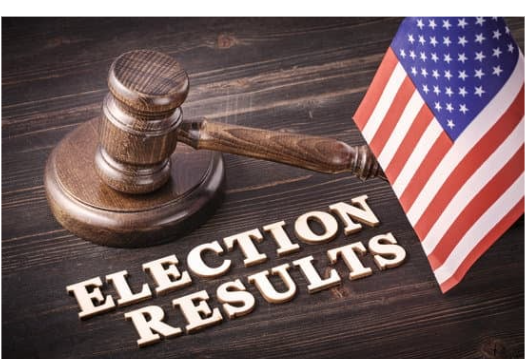
Navigating Business Strategy Amidst Political Crossroads: A Roadmap for CEOs and Business Owners
Posted on June 6, 2024 by Steven Tabor
A recent news poll found that Americans feel a sense of dread when thinking about the upcoming presidential election. Does this resonate with you?
For business owners, political uncertainty can feel even more intense considering the challenges and uncertainties that may disrupt their operations or put the breaks on sales. 1
Today’s business leaders stand at the intersection of economic forces, political landscapes, and strategic decision-making. The US economy started 2024 on a softer note than anticipated as elevated inflation and interest rates continued to weigh on the economy. Many experts see consumer spending growth to cool further and for overall GDP growth to slow to under 1% over the Q3-Q4 2024 period. The economy coupled with the upcoming election—whether Democratic or Republican—holds profound implications for businesses. Here are some considerations and actionable strategies that can steer our ships in the right direction.
The Economy and Political Impact
The Recession Rule
Historically, one economic factor has remained consistent: If a recession begins within two years before election day, the incumbent president is unlikely to be reelected. This rule underscores the importance of economic performance during election cycles. In the realm of politics and economics, there exists a longstanding principle known as the Recession Rule, which highlights the correlation between economic downturns and incumbent presidents’ reelection prospects. As forward-thinking business leaders, it is highly recommended to diligently track key economic indicators and pivot strategies in alignment with these economic trends to navigate the landscape of election cycles effectively.
Policy Changes and Business Adaptation
New presidents bring policy shifts—taxes, trade, regulations, healthcare, labor—that directly impact the cost of doing business. If the new administration raises the corporate tax rate, businesses face higher tax burdens. This reduces after-tax profits, affecting investment decisions, expansion plans, and overall competitiveness. Higher corporate taxes may discourage capital investment.
Companies may delay or scale down projects, impacting economic growth and job creation. Individual tax changes directly impact consumer spending. If personal income taxes increase, consumers may tighten their belts, affecting demand for goods and services.
Regardless of party lines, anticipate and respond to these changes proactively. Engage with industry associations, seek financial expertise, such as a strategic business advisor, and seek ways to transform these challenges into growth opportunities.
Strategies to Overcome Election Year Uncertainty
Strategic and Scenario Planning
During times of uncertainty, it’s recommended to develop a multi-year financial flight plan that evaluates various scenarios and maximizes income and business valuation. Start by defining your vision for the business. Where do you want your business to be in three, five, or ten years? Set clear objectives—whether it’s expanding market share, launching new products, or achieving sustainable profitability.
Amid an election year, businesses should adopt a strategic approach to financial planning to navigate through uncertainties and capitalize on opportunities. By projecting future revenues through a thorough analysis of historical trends, market conditions, and growth strategies, companies can make informed decisions to ensure financial stability. Be diligent and consistent in estimating operating costs, capital expenditures, and variable expenses accurately to maintain a healthy financial position. Additionally, monitoring cash inflows and outflows carefully enables businesses to identify potential shortfalls early on and leverage surpluses effectively. Embracing a proactive financial planning mindset is key for businesses to thrive amidst the dynamic landscape of an election year.
Inflationary Strategies
Since we are already in inflationary times, you may wonder, how much worse can it get. But in an election year and thereafter, keep an eye on rising prices—it affects both business costs and personal finances. As expenses increase, keep tabs on your cost of operations. Where can you make cutbacks without impacting quality, performance and efficiency? Be sure to retain your best employees by offering competitive compensation and benefits and be prepared for an uptick in demand when the economy accelerates.
Risk Management and Mitigation
In today’s volatile business landscape, business owners can prioritize comprehensive risk management strategies to navigate challenges and uncertainties effectively. With leading political candidates emerging and the potential for changes, engage with trusted risk management partners to anticipate and address any potential impacts on your business. Structure your discussions around key risk categories such as people risk, financial risk, liability risk, and partner risk to proactively identify and mitigate potential threats to your business operations and growth.
What risks in an uncertain environment would seriously harm your business (e.g., economic downturns, regulatory changes, supply chain disruptions)? Develop contingency plans for each risk. How will you navigate storms? Once you’ve identified weak spots in your cash flow and revenue streams, take regular course corrections and monitor and update scenarios based on market conditions. 2
Managing Health Care Coverage
Small businesses are grappling with the overwhelming burden of health care insurance, with a staggering 62 percent not being able to offer any coverage to their employees. These findings highlight the financial strain faced by many employers who do provide health insurance, with nearly half of them having to sacrifice profits or even operate at a loss to meet premium increases. This underscores the concerns and additional expenses businesses face. With the upcoming election, many are seeking a viable solution and support to alleviate the challenges of offering health care benefits to their employees. 3
Navigating Uncertainty
As the 2024 election approaches, accompanied by a cloud of uncertainty, businesses should be patient with whatever the outcome while remining steadfast in the face of potential economic shifts and policy changes. Being innovative in your business and maintaining adaptability is key. CEOs and business owners are the architects of their companies’ future, and it is imperative to steer towards resilience and prosperity regardless of political tides.
At B2B CFO our Partners understand the challenges you may face and are here to help your business create strategic plans to fortify finances, mitigate risks, and navigate complexities. Reach out to us today to ensure your business is well prepared for the road ahead. For a complimentary discussion, email me at StevenTabor@b2bcfo.com.
Resources:
1. Poll: ‘Dread’ tops list of Americans’ feelings about 2024 election
2. Navigating the 2024 Presidential Election: A Strategic Guide for Business Owners
3. What’s Driving Entrepreneurs This Presidential Election


